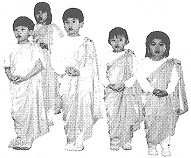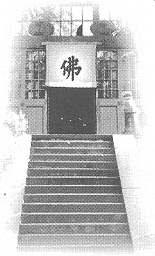|
 參、覺他 參、覺他
《大學》說:「大學之道,在明明德,在親民,在止於至善。」明明德,就是發揚人類光明的德性,這是自覺。儒家思想不但獨善其身,而且兼善天下,所以自覺以後,更有責任覺他──「明明德」之後還要「親民」。朱子讀「親」為「新」,「新民」就是教化人民,使人民自我革新。這樣的解釋,較解釋為「親愛」的「親民」更為貼切,含義更為深遠。
孔子是中華民族歷史上第一個最偉大的教育家,他首創的平民教育,開創了通向教育普及和文化下移的新道路,標誌著中國教育史從「學在官府」到「學移民間」之劃時代轉移。他的教育思想、教學方法,以及所倡導的互重互愛的師生關係,直到今天仍然值得我們學習和借鑿。
孔子的教育思想,和他的世界觀、政治觀密切相關:「仁」是孔子世界觀和真理觀的核心,孔子的教育工作以「仁」的人生哲學思想為基礎。在孔子的教育思想中,最光輝的一點,便是「有教無類」,即「人人應受教育」的主張。
「有教無類」是「汎愛眾,而親仁」的具體化。孔子從「仁」的觀念出發,對一切可能施教的人,只要「自行束脩以上」,都不拒絕進行教育,使其享有均等的受教機會。孔子提出了「有教無類」的主張,並且實踐了這個主張。他招收學生兼容並蓄,沒有貴賤、貧富、老幼、國籍等條件限制;這充分表現了孔子教育思想中的民主性。
孔子在教育實踐中,曾經提出一個重要的論點,就是「學而不厭」與「因材施教、誨人不倦」 ──這體現了孔子對學生認真負責的態度。孔子一生就是以這種認真嚴肅、踏實負責的教學態度,忠誠地、百折不撓地履行一個教師、一個教育家的義務和職責的。「學不厭」,是孔子自覺的工夫;「教不倦」,是孔子覺他的精神;「因材施教」,則是孔子度化的方法。也正是由於有「學而不厭」的扎實礎基,配合了「因材施教」的善巧方便,孔子得到「誨人不倦」的無礙自在,而成為「萬世師表」。
臨濟大師說:「隨處作主,立處皆真。」 一個經得起考驗的修行者應該是隨順世流而不被世流所移,見色不迷、聞聲不惑,達到不沾不礙的妙有境界。正如世尊之後的第二十二代印度摩奴那拏羅尊者所說:「心隨萬境轉,轉處實能幽。隨流認得性,無喜亦無憂。」 能夠這樣,才能方便隨緣,普度眾生。
大乘學者批評二乘「沉空守寂」,病在偏離中道。二乘是什麼?就是聲聞、緣覺。聲聞得道者為阿羅漢,緣覺得道者叫辟支佛,統稱二乘。二乘有什麼缺點呢?阿羅漢守寂,如舍利弗林中晏坐,被維摩詰大士呵斥。辟支佛則病在沉空,一切都空了;這叫什麼?這叫「惡取空見」的頑空。所以佛斥責冷漠、自了的小乘人為「焦芽敗種」。
二乘因利他、覺他心力量不夠堅強,只安住在自利;菩薩則充滿無私、無我的熱情,不但自己覺悟,還能夠以大悲心去開覺沉淪於生死苦海的有情,使眾生也能覺悟,以便得到解脫。所以菩薩又譯為「大道心的眾生」,就是「已發了大菩提心的眾生」。
菩提心有大有小,發小菩提心,是但求自了,就是只求自己解脫的小乘人;而發大菩提心,則是發廣度一切眾生的願心,以助眾生得解脫、成佛道為目標,就是大乘行者。像地藏王菩薩的大願力:「地獄不空,誓不成佛」,而且說:「我不入地獄,誰入地獄?」就是很好的榜樣。所以說菩薩不但自覺,也能覺他;修行若沒有菩薩的願力,就不能激發心力,也就不能發揮生命的最高價值;因此,修行人一定要有深宏大願。
 如果我們一直想到自己的利益,能快樂嗎?要好好思惟。愛己心太狹窄,綁住了自己,怎麼會得到真正的快樂?菩薩覺他、利他,善巧成就自己;凡夫執我,痛苦源源不絕。 如果我們一直想到自己的利益,能快樂嗎?要好好思惟。愛己心太狹窄,綁住了自己,怎麼會得到真正的快樂?菩薩覺他、利他,善巧成就自己;凡夫執我,痛苦源源不絕。
覺他,就是「以先覺覺後覺」的意思;眾生不能解脫,就是因為沒有覺悟。佛陀不忍自己解脫安樂,而坐視眾生沉淪苦海,所以將自己所覺悟的道理一一啟示他們。佛陀從初轉法輪到涅槃前,四十九年之間,宣說真諦,讓眾生離苦得樂,這就是「覺他」。
學佛的人最重要的使命是「嚴土熟生」:莊嚴佛土,有眾生的地方都是佛土;成熟眾生,使眾生有正見正行,使眾生由自我之愛,擴展為無緣大慈、同體大悲。眾生的痛苦由我來承擔,我的快樂讓眾生分享;能夠這樣,這個大宇宙、人生及地球,就會變成淨土。
 待續 待續
|
|
c) The Awakening of Others
The Great Learning says, “What the Great Learning teaches is to radiate with bright virtue; to renew the people; and to rest in the highest excellence.To radiate with bright virtue means to bring forth the luminous virtuous nature of humankind, i.e. to awaken oneself. Confucian thinking not only advocates personal goodness, but also promotes pervasive goodness in all beings. Thus after one has awakened oneself, one has the responsibility of awakening others. After one has understood virtue, one still has to teach and transform the populace. Philosopher Zhu Zi read the Chinese word 親for “drawing near” as 新 “renew”, which is to teach and transform the populace and enable them to rejuvenate and revitalize themselves. This explanation is even more apt and its implications are even more profound than the explanation of “drawing near to people.”
Confucius was the greatest educator in the history of the Chinese people. By first establishing education of the masses, he propagated and developed the new path of universal education and cultural dissemination. This created a remarkable historic transition in the history of Chinese education from “learning as being only for government officials” to “learning shifting to the masses.” Even today we can still learn and draw lessons from Confucius’ views on education, methods of teaching, as well as the relationship of mutual respect and concern that he promoted between teacher and student.
Confucius’ educational ideology was closely related to his views on the world and politics, which, together with his ideas about the Truth, took the benevolence as the basis. His teachings were based on taking benevolence as one’s philosophy of life. The most outstanding aspect of Confucius’ educational ideology was the advocacy of ‘educating all without discrimination’ and ‘everyone should receive an education.’
The phrase ‘educating all without discrimination’ is the embodiment of the saying “cherish all beings, and draw near to those who are good.” Based on the concept of benevolence, Confucius taught all men who were capable of learning. As long as they paid according to their means, he did not turn them away and everyone had equal opportunity to receive an education. By accepting students from all walks of life regardless of their social status, financial circumstances, age and nationality, Confucius put into practice his proposal of ‘educating all without discrimination.’
In terms of practical education, Confucius put forward the important proposition of ‘pursuing learning tirelessly’ while ‘teaching each student according to his ability’ and ‘teaching others without lassitude,’ that reflected his earnest and responsible attitude towards his students. Throughout his life, he adopted such strict discipline in his teaching. With unwavering steadfastness, he fulfilled his role and responsibilities as a teacher and educator.
‘Pursuing learning tirelessly’ reflects Confucius’ effort in achieving self-awakening, and ‘teaching others without lassitude’ demonstrates his spirit in helping others to awaken while ‘teaching accords to the student’s ability’ demonstrates his method of teaching. With a solid foundation from ‘learning tirelessly’ as well as the skillful expedience of ‘teaching according to the student’s ability’, Confucius achieved perfect mastery in ‘teaching others without lassitude’ and was named the Model Teacher for Endless Generations.
Great Master Linji once said, “Having self-mastery at all times, one sees the truth wherever one is.” A cultivator who can face up to tests should be one who accords with worldly affairs without being influenced. Not being distracted by forms or confused by sounds, one achieves the wonderful state of being untainted and unobstructed. Just as the Twenty-second Patriarch, Venerable Manorhita of India, said, “The mind, while turning with the myriad states, can actually remain tranquil in the midst of turning. Recognizing one’s nature while drifting along with the current, there is neither joy nor sorrow.” If one could be thus, one would then be able to use expedient means to accord with conditions and universally cross over living beings.
Scholars of the Great Vehicle criticize adherents of the Two Vehicles for deviating from the Middle Path by indulging in emptiness and stillness. Which are the Two Vehicles? They are the Sound-Hearers and Those Enlightened to Conditions. The enlightened Sound-Hearer refers to the Arhats and the one enlightened to Conditions refers to the Pratyekabuddhas. Collectively they are known as the Two Vehicles. What are their shortcomings? The Arhats observe stillness. For example, when Shariputra was meditating at ease in the forest, he was reprimanded by the Bodhisattva, Vimalakirti. The fault of the Pratekabuddhas is that they indulge in emptiness whereby absolutely everything is void. What is this? This is the dull emptiness resulting from attachment to voidness. That was why the Buddha admonished the aloof and self-ending Small Vehicle sages and likened them to withered sprouts and spoilt seeds.
As the Two Vehicles are not strong in their resolve to benefit and enlighten others, they can only benefit themselves; however, Bodhisattvas are imbued with the spirit of selflessness. Not only does a Bodhisattva achieve enlightenment himself, he brings forth great compassion to enlighten others who are sinking in the sea of suffering, thereby enabling them to be liberated from birth and death. Hence, Bodhisattvas are also ‘living beings with a great mind for the Way’ or ‘living beings who have a great resolve for enlightenment.’
The resolve for enlightenmnet may be great or small. People who give rise to a small Bodhi resolve are those of the Small Vehicle who only seek self-accomplishment and their own liberation. On the other hand, those who give rise to a great Bodhi resolve are cultivators of the Great Vehicle who not only seek their own liberation but vow to save all beings and help them attain liberation and achieve Buddhahood. Take for example the power of Earth Store Bodhisattva’s great vow: “If the hells are not empty, I will not become a Buddha,” and “If I don’t enter the hells, who would do it?” That’s why it is said that Bodhisattvas enlighten others as well as themselves. Cultivators who lack the strength of a Bodhisattva’s vows will not be able to muster their mind power and fulfill the highest value in life. Therefore, cultivators must make great and far-reaching vows.
Would we be happy if we were concerned only about our self-benefit all the time? Think about it. An egoistic mind is truly petty and restrictive. How can we achieve true happiness that way? By enlightening and benefiting others, Bodhisattvas skillfully attain self-accomplishment. Ordinary folks are attached to the ‘self’, hence their sufferings are endless.
Enlightening others means that one who is already enlightened helps others to become enlightened. Living beings are unable to be free because they are not awakened. Having attained liberation and bliss, the Buddha could not bear to just sit by and watch all the deluded beings sinking in the sea of suffering without offering a helping hand. He taught them the principles by which he himself became enlightened and vigorously employed all means to benefit them so that they could become enlightened together and obtain liberation and bliss. From the time when the Buddha first turned the Dharma wheel to the moment before he entered Parinirvana, he spent a total of forty-nine years expounding the Truth in order to enable living beings to leave suffering and attain bliss. This is the meaning of awakening others.
The most important mission for people who study the Buddhadharma is to adorn the Buddhaland and bring living beings to accomplishment. Adorning the Buddhaland also means adorning the mundane world because all places with living beings are considered Buddhalands. Bringing living beings to accomplishment means to help them bring forth proper views and proper conduct, and expand their selfish love into great kindness and compassion. Great kindness is an unconditional love for living beings. Great compassion is a sense of oneness with all and empathy for others. One take others’ sufferings as one’s own, while sharing one’s happiness with all living beings. In this way, the whole universe, including this world, transforms into the Pure Land.
To be continued
|